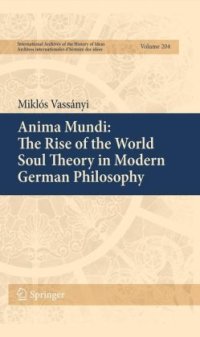
Ebook: Anima Mundi: The Rise of the World Soul Theory in Modern German Philosophy
Author: Miklós Vassányi (auth.)
- Tags: History of Philosophy, Philosophy of Religion, Philosophy of Nature, Metaphysics, History of Science
- Series: International Archives of the History of Ideas / Archives internationales d'histoire des idées 202
- Year: 2011
- Publisher: Springer Netherlands
- Edition: 1
- Language: English
- pdf
First affirmed by Plato, the concept of the world as a cosmic living being, possessed of a soul, gained great importance in the Stoic and Neo-Platonic philosophical schools. Several medieval philosophers displayed an interest in this theory of the world soul, which retained its attractive power even into the Renaissance. However, the leading early modern rationalists, especially Leibniz, found the world soul philosophically unacceptable. Why and how then did the German Romantics of the late 1700s and early 1800s – first and foremost Franz von Baader and Schelling – come resolutely to posit the existence of the world soul? In Anima Mundi: The Rise of the World Soul Theory in Modern German Philosophy , Miklós Vassányi shows that the metaphysical aspirations of the early German Romantics could not be satisfied by the Leibnizian concept of a God beyond the world. Powerful as Leibniz’s argument is when primarily the existence of God is considered, it fails to convincingly account for the presence of God within the world, and for the unity of the world. The fundamental existential experience of the Romantics was that God is immediately present in Nature, that God and Nature constitute an indissoluble Absolute. The best philosophical instrument to articulate their theory of the interpenetration of the Finite and the Infinite was a theory of the soul of the world.
This work presents and philosophically analyzes the early modern and modern history of the theory concerning the soul of the world, anima mundi. The initial question of the investigation is why there was a revival of this theory in the time of the early German Romanticism, whereas the concept of the anima mundi had been rejected in the earlier, classical period of European philosophy (early and mature Enlightenment). The presentation and analysis starts from the Leibnizian-Wolffian school, generally hostile to the theory, and covers classical eighteenth-century physico-theology, also reluctant to accept an anima mundi. Next, it discusses early modern and modern Christian philosophical Cabbala (B?hme and ?tinger), an intellectual tradition which to some extent tolerated the idea of a soul of the world. The philosophical relationship between Spinoza and Spinozism on the one hand, and the anima mundi theory on the other is also examined. An analysis of Giordano Bruno’s utilization of the concept anima del mondo is the last step before we give an account of how and why German Romanticism, especially Baader and Schelling asserted and applied the theory of the Weltseele. The purpose of the work is to prove that the philosophical insufficiency of a concept of God as an ens extramundanum instigated the Romantics to think an anima mundi that can act as a divine and quasi-infinite intermediary between God and Nature, as a locum tenens of God in physical reality.